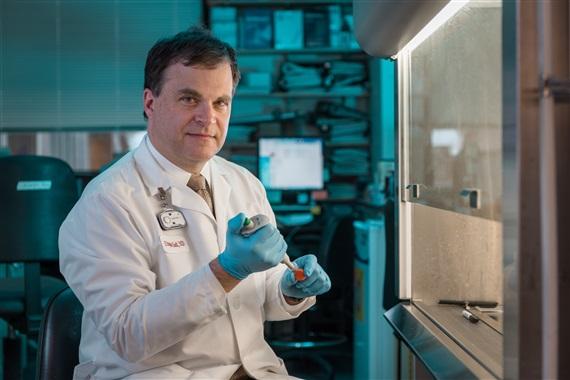Survival benefits of immunotherapy combination persist for more than six years in patients with advanced melanoma
- Higher percentage of patients treated with nivolumab and ipilimumab in clinical trial reach the six-and-a-half-year survival mark than those treated with either drug alone.
In the longest follow-up results from a clinical trial of combination immunotherapy for metastatic melanoma, investigators report that nearly half the patients who received the drugs nivolumab and ipilimumab were alive a median of six and a half years after treatment. The results, stemming from the CheckMate 067 clinical trial, represent a new landmark in survival rates for patients with melanoma treated with immune checkpoint inhibitor drugs.
F. Stephen Hodi, MD, the director of the Melanoma Center and the Center for Immuno-Oncology at Dana-Farber Cancer Institute is co-senior author of the study. Findings will be presented at the 2021 American Society of Clinical Oncology (ASCO) Annual Meeting, being held virtually June 4-8, 2021.
The clinical trial compared nivolumab and ipilimumab, alone and in combination, in patients with previously untreated stage III or IV melanoma that could not be removed surgically. Both drugs target proteins on T cells known as immune checkpoints, which some cancer cells exploit to spare themselves from an attack by the T cells. By interfering with these proteins, the drugs essentially release the brakes on such an attack. Nivolumab targets the PD-1 checkpoint protein, ipilimumab targets the CTLA-4 checkpoint protein.
In the trial, patients were randomly assigned to receive nivolumab and ipilimumab in combination, nivolumab plus a placebo, or ipilimumab alone. Six and a half years after treatment, participants who received the nivolumab-ipilimumab combination were more likely to be alive and to have had no advance of their disease than those who received either drug alone.
At the six-and-a-half-year mark, 49% of participants treated with the combination therapy were alive, compared to 42% of those treated with nivolumab alone, and 23% of those treated with ipilimumab alone. Progression-free survival – the percentage of patients alive and whose cancer hadn’t worsened – was 34% for the combination therapy group, 29% for the nivolumab-only group, and 7% for the ipilimumab-only group.
Median survival – the length of time that at least half the patients were still alive – followed the same pattern. For patients treated with nivolumab and ipilimumab, median survival was 72.1 months, or just over six years. For those treated with just nivolumab, median survival was 36.9 months, and for those treated with just ipilimumab, it was 19.9 months.
“This is the longest follow up for a phase III advanced melanoma clinical trial including nivolumab plus ipilimumab,” said Hodi. “It confirms a continued durable benefit for the combination.”
The clinical trial was supported by Bristol Myers Squibb.
CheckMate 067: 6.5-year outcomes in patients (pts) with advanced melanoma (abstract 9506) will be presented virtually by Jedd D. Wolchok, MD, PhD, Memorial Sloan Kettering Cancer Center, during the Melanoma/Skin Cancers Oral Abstract Session on Sunday, June 6, 2021, 8:00am-11:00am.
For all ASCO-related media inquiries, call or email Victoria Warren, 617-939-5531, Victoria_Warren@dfci.harvard.edu. Follow the meeting live on Twitter using the hashtag #ASCO21 and follow Dana-Farber on Twitter at @DanaFarberNews.
Media Contacts
If you are a journalist and have a question about this story, please call 6176324090 and ask to speak to a member of the media team, or email media@dfci.harvard.edu.
The Media Team cannot respond to patient inquiries. For more information, please see Contact Us.
